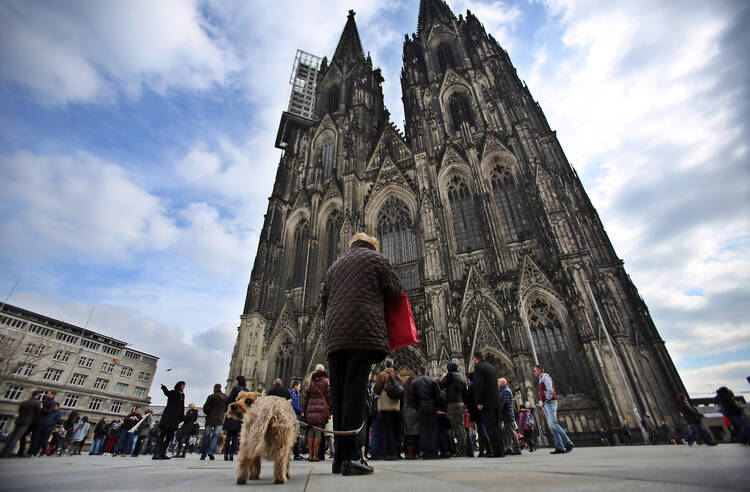The first police report was calming: The New Year’s celebrations in Cologne went peacefully. Shortly afterwards completely different news was spreading: That night women were surrounded by groups of men, sexually assaulted and violently attacked on the forecourt of Cologne’s central train station—in the immediate vicinity of the world-famous Cologne Cathedral, Germany’s most frequently visited sight.
Meanwhile more than 550 charges have been filed. The police president of Cologne had to retire early. Opposition parties demand the resignation of the Interior Secretary of the state North Rhine-Westphalia, who had lambasted his police forces earlier (as did Federal Secretary of the Interior Thomas de Maizière).
So far 19 suspects have been tracked down. Ten of them are applicants for asylum; nine suspects are illegal immigrants. Fourteen of these 19 men originate from Morocco and Algeria, one from Syria; two of the suspects are unaccompanied juvenile refugees. None were residents of Cologne. Not all of the perpetrators have been identified yet. Social networks are full of posts with pictures of possible suspects.
During the first days after NewYear’s Day much guesswork was being done: Were the assaults coordinated? Organized? Perhaps actuated by “Pegida” (an acronym that stands for “Patriotic Europeans Against the Islamization of the Occident”)—a right-wing populist movement that started out from Dresden in October 2014 and organizes rallies against the immigration and asylum policies of the federal government?
Federal Minister of Justice Heiko Maas believes that the encroachments were masterminded by some obscure entity: “When a mob like that gets together to commit criminal acts, this seems to have been planned in some form or another.” Still, there are many contradictory pieces of information. And many open questions. The state parliament of North Rhine-Westphalia established a committee investigation. Undeniably, a whole number of breakdowns in communication between local and federal police are part of the problem. Who will be politically liable?
Attacks and assaults were also reported from other German cities, including Munich. But the assaults of Cologne are iconic. The Cathedral Plaza, a huge public space of 7,000 square meters, connecting Cathedral and Central Station, is a symbol for Germany. In a commentary, the phrase of the “Arabic Cathedral Plaza” was already coined. Does it indicate a change of societal atmosphere? Will Ms. Merkel (“We will make it!”) fail? Will all refugees eventually be stigmatized as potential criminals, violent offenders, sexists?
Clearly, there is a potential for violence. A broad public debate is needed. Something like a “clash of civilizations” cannot be denied. What’s the significance of a tabooed sexuality here? In Arab countries, the phenomenon is known as “taharrsuh gamea” (“street harassment”). It would be a mistake to put refugees under general suspicion and to stigmatize them indiscriminately as sexual offenders.
According to recent surveys, more than 60 percent of the Germans did not alter their favorable attitude toward foreigners after the incident. But 40 percent and counting now show an increasingly negative estimate. People of 60 years and above are significantly more negative than the young. Quite unlike the average of the German citizens, 72 percent of the adherents of the right-wing party AFD (“Alternative for Germany”) state that they are now “more critical and negative” in their attitude toward foreigners and refugees.
What should leaders of the two big churches of Germany—Protestants and Catholics—do? They could weigh in to de-escalate of the situation: Speak up against blanket judgments and stigmatizing. Call a halt to hysteria. Be advocates for human rights and the dignity of refugees and asylum seekers. Facilitate a broad discussion in the society, governed by fairness and differentiated judgments toward other cultural habits and convictions.
It cannot be tolerated that juvenile refugees are sweepingly suspected as clandestine sexual predators and dismissed as machos. However, there is no denying that non-European, Muslim men need to look into their attitude towards women and let their attitude be questioned. Angela Merkel already stated that she will hang on to her refugee policy “despite Cologne.”
Can stricter laws and quicker removals of criminal foreigners help prevent encroachments? They can deter. But they cannot replace a societal debate. Such a debate is long overdue, but it needs to be pursued on all levels of the society. It must not be left to demagogues who are eager to exploit the situation politically. Being a Christian never comports with racism, agitation toward foreigners and xenophobia—not even in the name of the so-called “Christian occident.” Europe is a multi-cultural, multi-ethnic and multi-religious reality, and Islam belongs to today’s Germany as well as it belongs to France or Spain. It must not be lumped together with Islamism and the terror of ISIS.
This affair is about women who are molested and attacked. It is about youth. It is about refugees and asylum seekers. Germany is strong enough for substantial debates. Superficiality and propaganda will not be helpful here.
Andreas R. Batlogg, S.J., is the publisher and editor-in-chief of of the Jesuit monthly Stimmen der Zeit.








